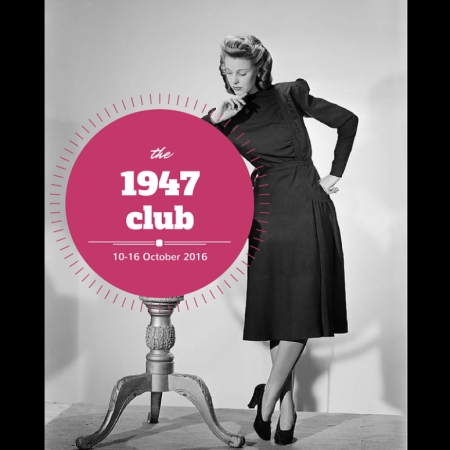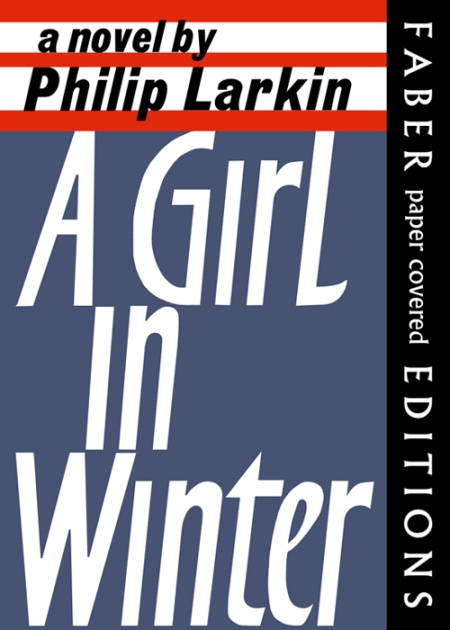It’s 1947 Club time, and my first book is A Girl in Winter by Philip Larkin. There are some spoilers in what follows. Jacqui has posted an excellent, spoiler-free write-up of the book here.
I’d been under the impression that Larkin’s two novels, written before he became established as a poet, were a kind of shameful secret, Philippa Martinez-style romances written for the mass market. It turns out I was misled. He wrote this book in his early twenties while working at Wellington Library in Shropshire ‘handing out tripey novels to morons’. You’ve got to do something to preserve your sanity.
The girl of the title is Katherine Lund, an émigrée from an unspecified European country working in an English provincial library during the war. She has a hateful boss, Mr Anstey, and no friends. Several summers earlier, following her participation in a school letter exchange scheme, she spent three weeks staying with her correspondent, Robin Fennel, at his family’s Oxfordshire home. In her present-day loneliness, she has reestablished contact with the Fennels, and the action of the book takes place on the day that she receives a message from Robin to say he is coming to visit her. The book is divided into three parts, the central one consisting of a flashback to Katherine’s visit to the Fennels’ before the war.
Let’s start at the very beginning, which strikes me as a very good place to start, with a description of the snow on that winter morning:
It lay in ditches and in hollows in the fields, where only birds walked. In some lanes the wind had swept it faultlessly to the very tops of the hedges. Villages were cut off until gangs of men could clear a passage on the roads; the labourers could not go out to work, and on the aerodromes near these villages all flying remained cancelled. People who lay ill in bed could see the shine off the ceilings of their rooms, and a puppy confronted with it for the first time howled and crept under the water-butt.
You might have guessed Larkin was going to turn into a good poet from his eye for the small detail. The way you can tell it’s snowed even before you look out of the window, from the changed quality of the light. Small details impressed me throughout. Katherine is delegated to escort an ill colleague home, and finds that her anticipation of hearing from Robin makes her more disposed to do this good deed, a labour of displaced love; when, in the flashback section, she meets Robin for the first time, having exchanged many letters with him, she finds the intimacy of their correspondence counts for nothing in person, and they effectively have to build a relationship from scratch.
Elsewhere Larkin has a nice line in pencil portraits of people, skewering them neatly. The delight present in Robin’s stand-offish sister Jane, for instance, when Katherine upsets a teacup: ‘Her gaiety still seethed quietly within her.’ Or Miss Parbury, whose handbag Katherine restores to her after a mix-up: ‘Rather tall, with a rosy complexion and fair hair, she looked like a large tea-rose gone well to seed.’
Many specific details, though, are shunned. Larkin creates a vivid sense of time and place, but exactly where Katherine is working isn’t at all clear, though we know it’s not London. And just who is she? Where is she from? Her being in England, it is occasionally hinted, is the result of an unpleasant incident, but no further information is given. Is she a Jewish refugee? She admits to Miss Parbury, ‘If there wasn’t a war, I shouldn’t be here.’ Her name, Katherine Lind, makes some readers think her Scandinavian; I think German is more likely, given that we know Robin can speak her language. (In a neat touch that made me smile, the passages where Katherine and Robin talk in her own language are notated not with speech marks as they would be in an English book, but with dashes, the convention on the continent, to differentiate them from the surrounding English dialogue.)
Katherine’s past is a blur, even to her. The middle section, although seen from her perspective, is narrated from its own time. When we return to the present day, we find that Katherine’s own memories of the period, which we have read about very closely, have deteriorated, so that she can’t be sure of the truth. Did she fall in love with Robin, and is that why she’s so worked up about his coming to see her? It’s easy to see why she might have done so. Before she comes to visit, he sends her a photo of himself so that she will be able to identify him when she arrives.
The photograph showed him looking at the camera with his hands on his hips, lit by brilliant sunlight, wearing a cricket shirt. There was a swing in his body that suggested he had been called and had turned momentarily back while the picture was taken. He was dark and slight, with long eyelashes. The expression on his face was evasive in the sense of not being fully captured by the camera. Rather to her surprise, she had shown it to nobody except her parents.
Reading that, I’m a bit in love with him myself. The thing is, though, that love doesn’t seem to be on the cards. The flashback section reminded me very strongly of a book from a few years later, L.P. Hartley’s The Go-Between. Katherine, like Leo, is an outsider in a world of unaccustomed privilege where people behave according to a different code. It’s a hot summer, there are games to be played and walks to be taken, everything’s beautifully repressed. A scene where Robin frees a moth from the house is like the scene in The Go-Between where Leo dries Marian’s hair with his bathing suit, a fuss over nothing, with the maintenance of appearances the main consideration. Towards the end of Katherine’s stay, a group photo is taken. In some novels a photograph would serve as a nostalgia-creating device, something to give the episode an idyllic haze, but not here. Katherine’s not happy with the photo, and indeed, unlike Leo, she doesn’t seem to have been bewitched at all by her hosts, who have been polite but often not much more than that. It certainly doesn’t appear that Robin has designs on her. And then, just before she leaves, something happens.
It’s the final section of the book that’s the most interesting, and where the Larkin familiar from the poems is most in evidence. Katherine has a bad day at work, Mr Anstey having been particularly foul to her, and feels disillusioned. Her misanthropy, her disgust at the sordidness and emptiness of human existence, feels like Larkin’s. It was in the passages of despair that I felt closest to her myself. Panicked at the prospect of seeing Robin again, Katherine contrives to miss him, then regrets it, and finally, unexpectedly, finds him waiting for her when she gets home. They talk, she cooks him some food, and they go to bed together.
Larkin’s plot springs a few surprises along the way, so much so that I occasionally thought, is this supposed to be a suspense novel? because if it is there surely ought to be some suspense, not just the revelation. The going to bed is very much a surprise, but (I thought) a happy one.
Afterwards, Katherine and Robin talk. My thoughts turned automatically to Larkin’s poem ‘Talking in Bed’.
Talking in bed ought to be easiest,
Lying together there goes back so far,
An emblem of two people being honest.
Except that the rest of Larkin’s poem is about how people eventually fail to talk together in bed, whereas Katherine and Robin’s conversation might be the most intimate they’ve had. Sex is a watershed in several Larkin poems, such as ‘Annus Mirabilis’ and ‘High Windows’, though Larkin invariably places himself on the outside. Living is something that other people do. Most pertinent, perhaps, is his marvellous poem ‘I Remember, I Remember’, where he passes through Coventry on a train, ‘where my childhood was unspent’, and proceeds to catalogue the many things he didn’t do in his youth. Katherine’s concerns are Larkin’s, are all of ours, I suspect. She’s missing something. For the moment, Robin will do. Tomorrow, who knows? We carry on. Larkin’s poem ends, ‘Nothing, like something, happens anywhere.’ In some circumstances, that thought can be a consolation.






